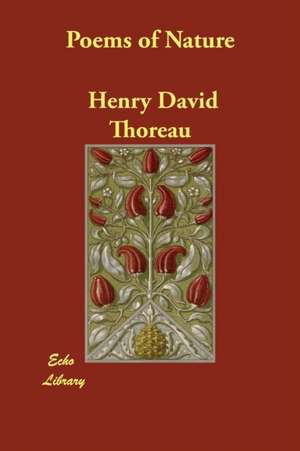Poems of Nature
Autor Henry David Thoreau Editat de Frank·B. Sanbornen Limba Engleză Paperback – 27 noi 2019
| Toate formatele și edițiile | Preț | Express |
|---|---|---|
| Paperback (3) | 54.92 lei 38-45 zile | |
| Echo Library – 27 noi 2019 | 54.92 lei 38-45 zile | |
| Binker North – 10 iun 2023 | 74.81 lei 6-8 săpt. | |
| Blurb – 2 apr 2023 | 81.85 lei 6-8 săpt. |
Preț: 54.92 lei
Nou
Puncte Express: 82
Preț estimativ în valută:
10.51€ • 11.01$ • 8.69£
10.51€ • 11.01$ • 8.69£
Carte tipărită la comandă
Livrare economică 07-14 aprilie
Preluare comenzi: 021 569.72.76
Specificații
ISBN-13: 9781406898149
ISBN-10: 1406898147
Pagini: 84
Dimensiuni: 152 x 229 x 4 mm
Greutate: 0.14 kg
Editura: Echo Library
ISBN-10: 1406898147
Pagini: 84
Dimensiuni: 152 x 229 x 4 mm
Greutate: 0.14 kg
Editura: Echo Library
Notă biografică
Henry David Thoreau (July 12, 1817 - May 6, 1862) was an American naturalist, essayist, poet, and philosopher. A leading transcendentalist, he is best known for his book Walden, a reflection upon simple living in natural surroundings, and his essay "Civil Disobedience" (originally published as "Resistance to Civil Government"), an argument for disobedience to an unjust state.Thoreau's books, articles, essays, journals, and poetry amount to more than 20 volumes. Among his lasting contributions are his writings on natural history and philosophy, in which he anticipated the methods and findings of ecology and environmental history, two sources of modern-day environmentalism. His literary style interweaves close observation of nature, personal experience, pointed rhetoric, symbolic meanings, and historical lore, while displaying a poetic sensibility, philosophical austerity, and attention to practical detail.[4] He was also deeply interested in the idea of survival in the face of hostile elements, historical change, and natural decay; at the same time he advocated abandoning waste and illusion in order to discover life's true essential needs
